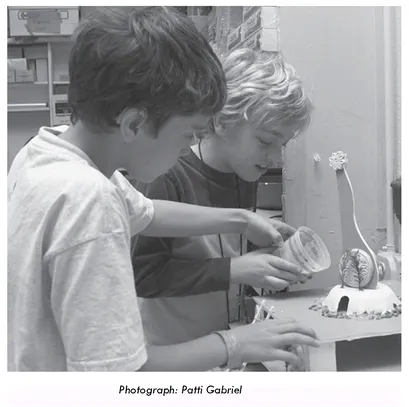
eBook - ePub
Celebrating Every Learner
Activities and Strategies for Creating a Multiple Intelligences Classroom
Thomas R. Hoerr, Sally Boggeman, Christine Wallach
This is a test
Condividi libro
- English
- ePUB (disponibile sull'app)
- Disponibile su iOS e Android
eBook - ePub
Celebrating Every Learner
Activities and Strategies for Creating a Multiple Intelligences Classroom
Thomas R. Hoerr, Sally Boggeman, Christine Wallach
Dettagli del libro
Anteprima del libro
Indice dei contenuti
Citazioni
Informazioni sul libro
Howard Gardner's groundbreaking theory applied for classroom use
This important book offers a practical guide to understanding how Howard Gardner's theory of Multiple Intelligences (MI) can be used in the classroom. Gardner identified eight different types of intelligence: linguistic, logical, spatial, musical, bodily-kinesthetic, naturalist, interpersonal, and intrapersonal. Celebrating Every Learner describes the characteristics of each type of intelligence and follows up with ready-to-use lesson plans and activities that teachers can use to incorporate MI in their pre-K through 6 classrooms.
- Offers a treasury of easily implemented activities for engaging all students' multiple intelligences, from the New City School, a leading elementary school at the forefront of MI education
- Provides ready-to-use lesson plans that teachers can use to incorporate MI in any elementary classroom
- Includes valuable essays on how and why to integrate MI in the classroom
- Hoerr is the author of a bi-monthly column for Educational Leadership as well as the editor of the "Intelligence Connections" e-newsletter
Domande frequenti
Come faccio ad annullare l'abbonamento?
È semplicissimo: basta accedere alla sezione Account nelle Impostazioni e cliccare su "Annulla abbonamento". Dopo la cancellazione, l'abbonamento rimarrà attivo per il periodo rimanente già pagato. Per maggiori informazioni, clicca qui
È possibile scaricare libri? Se sì, come?
Al momento è possibile scaricare tramite l'app tutti i nostri libri ePub mobile-friendly. Anche la maggior parte dei nostri PDF è scaricabile e stiamo lavorando per rendere disponibile quanto prima il download di tutti gli altri file. Per maggiori informazioni, clicca qui
Che differenza c'è tra i piani?
Entrambi i piani ti danno accesso illimitato alla libreria e a tutte le funzionalità di Perlego. Le uniche differenze sono il prezzo e il periodo di abbonamento: con il piano annuale risparmierai circa il 30% rispetto a 12 rate con quello mensile.
Cos'è Perlego?
Perlego è un servizio di abbonamento a testi accademici, che ti permette di accedere a un'intera libreria online a un prezzo inferiore rispetto a quello che pagheresti per acquistare un singolo libro al mese. Con oltre 1 milione di testi suddivisi in più di 1.000 categorie, troverai sicuramente ciò che fa per te! Per maggiori informazioni, clicca qui.
Perlego supporta la sintesi vocale?
Cerca l'icona Sintesi vocale nel prossimo libro che leggerai per verificare se è possibile riprodurre l'audio. Questo strumento permette di leggere il testo a voce alta, evidenziandolo man mano che la lettura procede. Puoi aumentare o diminuire la velocità della sintesi vocale, oppure sospendere la riproduzione. Per maggiori informazioni, clicca qui.
Celebrating Every Learner è disponibile online in formato PDF/ePub?
Sì, puoi accedere a Celebrating Every Learner di Thomas R. Hoerr, Sally Boggeman, Christine Wallach in formato PDF e/o ePub, così come ad altri libri molto apprezzati nelle sezioni relative a Education e Education Teaching Methods. Scopri oltre 1 milione di libri disponibili nel nostro catalogo.
Informazioni
Part 1
The Multiple Intelligences

1
The Interpersonal Intelligence
“But an important variable in leadership seems to be the ability to sense, to be aware of, what is going on in oneself as well as what is happening in the group or organization.”
—JOSEPH LUFT

Web of the Interpersonal Intelligence
Student Quotes
“Having a strong Interpersonal Intelligence is not only about interacting with others, but also thinking for and about others.”
“ I’m Interpersonal because I get along with people. I share my markers with my brother and my games with my sister.”
“ I’m Interpesonal because I like to work in groups and hear someone else’s point of view and what they are thinking.”
“ I love to be around people, and I like to figure things out by talking with others.”
Characteristics
• Enjoys cooperative games, demonstrates empathy toward others, has lots of friends, is admired by peers, displays leadership skills, prefers group problem solving, can mediate conflicts, understand and recognizes stereotypes and prejudices

Famous People
BARACK OBAMA is the forty-fourth president of the United States and the first African American to hold that office.
ELEANOR ROOSEVELT advocated for social reforms that helped the disadvantaged.
OPRAH WINFREY is the host of an internationally syndicated talk show and considered one of the most influential women in the world.
MAHATMA GANDHI was the preeminent political and spiritual leader of India during the Indian independence movement.
Adult Quotes
“ The best way to cheer yourself up is to try to cheer somebody else up.”
—MARK TWAIN
—DANIEL GOLEMAN

The Interpersonal Intelligence
BY LAURIE FALK
In understanding the development of children, there has long been a debate of nature versus nurture. How much comes with a child on the day of birth? How much can we teach? By and large, the answer to the nature/nurture debate is that both matter. This is true for all of the intelligences, including the Interpersonal Intelligence—the ability to understand people and relationships. We, as educators, belong to the set of nurturers in a child’s life, and the school setting offers a prime location for development of the Interpersonal Intelligence—a very important intelligence indeed!
When babies are born, they are by necessity egocentric creatures. Before long, though, they embark on interactions with parents and caregivers that begin their interpersonal journey. Throughout their development, children are constantly learning about themselves and how they are connected to the outside world. This interplay between the developing Intrapersonal and Interpersonal intelligences and relationships with self and with others continues throughout life, but its foundations are set in childhood. We are social animals, and a sense of belonging is critical to our emotional health and well-being. However, the rules, norms, and expectations of social interactions are very complex. Add innate temperament, varied family backgrounds, and cultural diversity to the mix and the task of teaching the Interpersonal Intelligence can seem almost overwhelming. But this need not be the case.
We, as educators, belong to the set of nurturers in a child’s life, and the school setting offers a prime location for development of the Interpersonal Intelligence—a very important intelligence indeed!
There are some important facts about the development of the Interpersonal Intelligence to keep in mind. First, much of this happens organically as human beings constantly interact with each other in many settings throughout life. This development of social learning is obvious with younger children. For example, one expects very young children to learn that verbal expression is more appropriate than physical aggression. One need only to watch a group of four year-olds and their teachers to see this skill being taught and progress being made. This kind of teaching is critical to the development of social skills. The school setting gives the adults a chance to intervene and use those teachable moments when interpersonal interactions are not going according to standards of acceptable behavior. It is imperative that we attend to child-to-child and child-to-adult interactions and use the opportunities that present themselves to teach children appropriate behaviors in real time. However, it is not just young children whose social interactions need to be observed and corrected—the fourth grade student who makes fun of another student needs adult intervention just as much as the four-year-old does. This experiential teaching tool is invaluable; it can seem time-consuming, but it is time well spent. Regardless of a student’s age, we need to intervene when the opportunity presents itself; after all, we are also teaching when we ignore inappropriate behaviors.
It is imperative that we attend to child-to-child and child-to-adult interactions and use the opportunities that present themselves to teach children appropriate behaviors in real time.
In addition to using teachable moments, the development of an Interpersonal Intelligence should also be taught from a planned curriculum. Specific interpersonal lessons are no different than math or linguistic lessons. If something needs to be learned, it must be consciously taught and reinforced. For example, a teamwork lesson would include instruction on the rationale for working together in groups, the specific steps to doing so successfully, and explanations of the interactive process. Then there would be a practice activity on teamwork. But this is not a one-time lesson or practice session. Teachers must give students many opportunities to practice all the skills needed for successful teamwork and acknowledge the students when they are using these skills appropriately. Additionally, they must allocate time for student reflection. If students are to learn from their experiences, it is important that they consciously think about what happened and their role in it.
If something needs to be learned, it must be consciously taught and reinforced. If students are to learn from their experiences, it is important that they consciously think about what happened and their role in it.
Just as in teaching mathematics or history, reflection is best if it is done in different ways. Certainly there are times when a group discussion provides students with the chance to process the lesson together and to engage in a group activity where insights can be shared. At other times, however, individual reflection can take place by writing in journals or by reflecting on a few questions during quiet time allocated for thinking about what the lesson means to them....